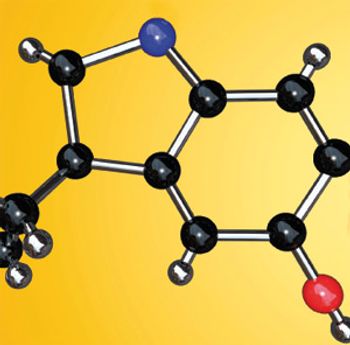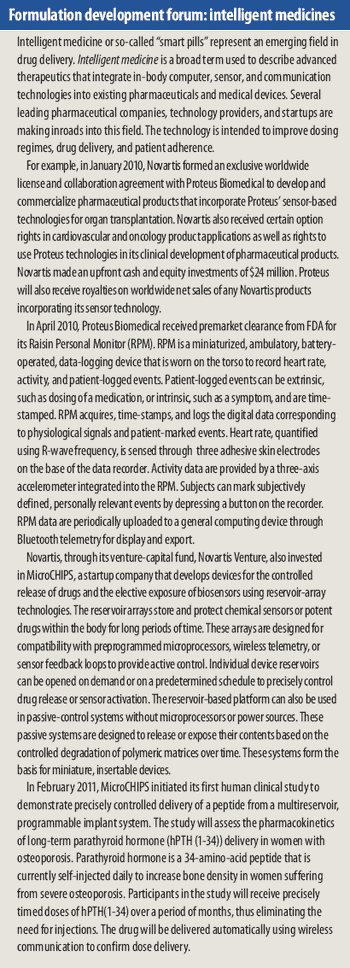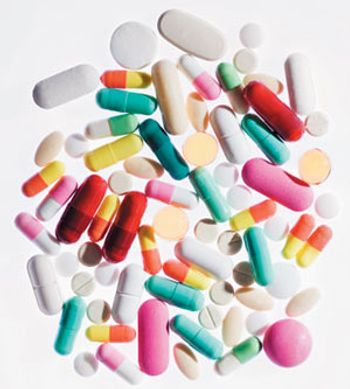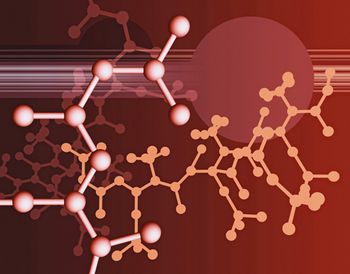
Chemocatalytic and biocatalytic routes play an important role in improving the manufacture of intermediates and active pharmaceutical ingredients.
Patricia Van Arnum was executive editor of Pharmaceutical Technology.

Chemocatalytic and biocatalytic routes play an important role in improving the manufacture of intermediates and active pharmaceutical ingredients.

The need for greater process understanding raises the bar for suppliers.

This technical forum is part of a special issue on Solid Dosage and Excipients.

Nanotechnology often is associated with parenteral drug delivery, particularly for anticancer therapies, but it also has applications in oral drug delivery

AstraZeneca has been informed that the UK and US governments? tax authorities have agreed to the terms of an advance-pricing agreement regarding transfer-pricing arrangements for AstraZeneca?s US business for the 13-year period from 2002 to the end of 2014.

The Bulk Pharmaceutical Task Force (BPTF) of the Society for Chemical Manufacturers and Affiliates (SOCMA) and the European Fine Chemicals Group (EFCG) of the European Chemical Industry Council (CEFIC) are calling on FDA to mandate inspections of foreign active pharmaceutical ingredient (API) manufacturing sites with the cost borne by those sites being inspected. Both organizations have indicated a willingness to pay fees for these inspections when performed on their member-owned facilities that are located outside the United States.

AstraZeneca announced this week that it will discontinue the production of Pulmicort (budesonide) 100 and 200 µg/dose HFA (hydrofluoroalkane) pressurized metered-dose inhaler (pMDI) due to manufacturing issues related to technical aspects of the device, which prevents the ongoing manufacture of the product.

Fujifilm and Merck & Co. have formed a definitive agreement by which Fujifilm will acquire the Merck BioManufacturing Network, a contract biopharmaceutical manufacturing and development business of Merck.

Pharmaceutical Technology's annual survey on equipment and machinery reveals the spending levels and type of spending made in 2010 and planned for 2011.

The power of emerging markets is reflected in the pharma's sales and production positions.

Bristol-Myers Squibb opens a new pediatric HIV/AIDS clinic in Tanzania.

Contract manufacturers and fine-chemical suppliers announce capacity expansions and service enhancements of Informex.

The Society of Chemical Manufacturers and Affiliates (SOCMA), in a statement submitted to the US House Subcommittee on Cybersecurity, Infrastructure Protection and Security Technologies, called for Congressional action to pass a three-to-five year authorization of current Chemical Facility Anti-Terrorism Standards (CFATS), which are scheduled to expire Mar. 4, 2011.

President Barack Obama released his budget proposal for fiscal year (FY) 2012, which shows an increase in funding for the US Food and Drug Administration.

President Barack Obama's State of the Union address, delivered last week on Jan. 25, 2011, to the US Congress, was largely well received by the pharmaceutical and biotechnology industries.

The Novartis Foundation for Sustainable Development held a symposium in December 2010 to continue dialogue on how the private and public sector can work together in achieving the UN Millennium Development Goals.

Will 2011 be a more promising year for new molecular entities? A review of Big Pharma's late-stage pipeline shows what might lie ahead.

One year following the earthquake in Haiti, the pharmaceutical industry and private sector participate in efforts for long-term relief.

As the industry prepares for Informex, the trade show of custom and batch manufacturers in Charlotte, North Carolina, a roundup of key recent developments.

The article examines pharmaceutical market growth, company positioning, and the innovation potential in emerging markets. Read this and other preferred organization articles in this special issue.

Pharmaceutical-industry executives from Merck & Co., Pfizer, and Covidien share their perspectives on their expectations and evaluation in the preferred-provider relationship. Read this and other preferred organization articles in this special issue.

Reflecting the manufacturing restructuring ongoing in the bio/pharmaceutical industry, Amgen and sanofi-aventis announced the sale of manufacturing facilities to contract manufacturers.

GlaxoSmithKline has responded to a recently aired 60 Minutes program about the whistleblower lawsuit that resulted in GSK paying $750 million to settle civil and criminal charges.

GlaxoSmithKline (GSK) issued a statement on Jan. 2, 2011, to respond to a 60 Minutes segment that aired on Jan. 2 that focused on quality-control problems at a former GSK manufacturing facility in Cidra, Puerto Rico.

Pharmaceutical Technology discusses the key issues and trends facing the pharmaceutical supply chain with Bob Kanuga, executive director of the external manufacturing organization with Merck & Co. Inc. and president of the Drug, Chemical and Associated Technologies Association (DCAT).

An assessment of the progress and needed activity to achieve global sustainability goals shows Brazil and India leading G20 economies.

Representatives from the United Nations, governments, businesses, and nonprofit groups met in Cancún, Mexico, to move forward international efforts for meeting climate-change goals.

Contract manufacturers strengthen their toolboxes and partnerships as they navigate the changing drug-development model.

Industry executives share insight into the future direction of drug manufacturing and the supply chain. This article contains online bonus material.

Analysis of crospovidone as a superdistingrant.